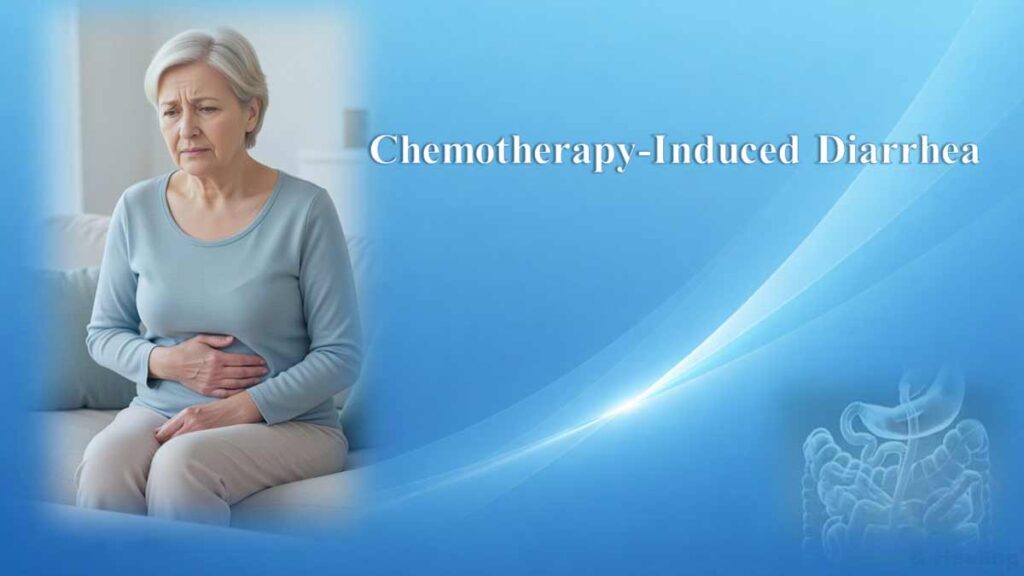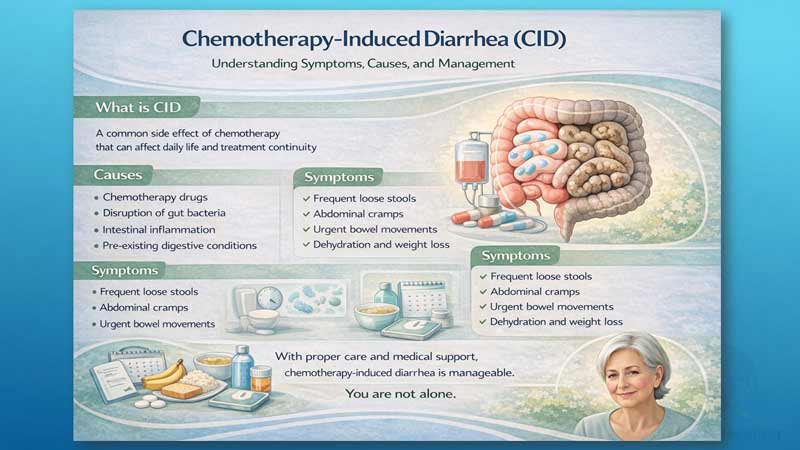
Chemotherapy-induced diarrhea (CID) is a common side effect that is sometimes underestimated. However, it can significantly disrupt a patient’s daily life, cause distress and discomfort, and—if not properly managed—lead to serious complications. The impact of CID goes beyond physical symptoms, and in some cases, it may slow down or even interrupt cancer treatment.
Understanding the symptoms, preventive strategies, and effective management options for CID plays a vital role in maintaining quality of life and supporting the successful continuation of treatment—for both patients and their caregivers.
Causes of Chemotherapy-Induced Diarrhea
Chemotherapy-induced diarrhea can develop due to several factors, including:
- Chemotherapy medications: Certain chemotherapy drugs—such as irinotecan, fluorouracil, and capecitabine—are more likely to cause diarrhea. These medications can damage the intestinal lining and lead to gastrointestinal side effects.
- Disruption of gut microbiota: Chemotherapy can disturb the natural balance of beneficial gut bacteria, allowing harmful bacteria to grow or infections to develop.
- Intestinal inflammation: Some chemotherapy agents cause inflammation of the intestinal tissues, increasing bowel movement activity and resulting in diarrhea.
- Pre-existing conditions: Patients with prior gastrointestinal disorders may be at higher risk of developing CID.
Symptoms of Chemotherapy-Induced Diarrhea
Symptoms of CID may include:
- Frequent loose or watery stools
- Abdominal cramping, pain, or spasms
- Urgent need to use the bathroom
- Unintentional weight loss
- Signs of dehydration, such as thirst, dry mouth, reduced urination, and dizziness

Severity of Diarrhea: More Important Than Diarrhea Itself
Chemotherapy-induced diarrhea is generally classified as mild, moderate, or severe, and each level requires a different level of attention.
Mild Chemotherapy-Induced Diarrhea
- Slight increase in bowel movements
- Looser stools than usual
- Mild abdominal discomfort
- Daily activities are mostly unaffected
What this means:
In most cases, mild diarrhea can be managed with dietary adjustments, adequate fluid intake, and simple supportive care.
Moderate Chemotherapy-Induced Diarrhea
- More frequent watery stools
- Abdominal cramping, bloating, or pain
- Fatigue and weakness
- Difficulty performing daily activities
What this means:
This stage should not be ignored. The healthcare team should be informed to prevent worsening symptoms.
Severe Chemotherapy-Induced Diarrhea
- Frequent, severe watery diarrhea
- Intense abdominal pain
- Clear signs of dehydration (dry mouth, dizziness, decreased urination)
- Inability to eat or drink
- Significant disruption of daily life
What this means:
This is a medical emergency that requires immediate attention. Delaying care may lead to severe dehydration, electrolyte imbalance, or interruption of cancer treatment.
When Is Diarrhea a Medical Emergency?
Seek medical attention immediately if any of the following occur:
- Diarrhea persists for more than 24 hours despite treatment
- Blood or mucus appears in the stool
- Fever or severe weakness develops
- Symptoms of dehydration worsen
- Diarrhea is accompanied by vomiting

A Daily Routine for Preventing and Managing Chemotherapy-Induced Diarrhea
Morning Care
After waking up, avoid rushing. Sit for a few minutes before standing to reduce dizziness caused by dehydration. Even if the urge is mild, use the bathroom—early bowel emptying may help reduce later urgency. Wear loose, comfortable clothing that does not put pressure on the abdomen. After each bowel movement, apply a gentle protective or moisturizing cream to the anal area to prevent irritation and skin damage.
Managing Diarrhea Throughout the Day
Do not wait until you feel thirsty—thirst is a late sign of dehydration. Sip fluids slowly and frequently rather than drinking large amounts at once. Avoid artificial sweeteners, sugar alcohols, and very sweet drinks, as they may worsen diarrhea. If you feel weak, prioritize rest over productivity; conserving energy supports healing. Plan activities close to a bathroom, and on difficult days, avoid unnecessary outings.
Evening and Night: Calming the Gut and the Mind
Evening is a time to calm both the digestive system and the mind. Avoid emotional or stress-related eating. Gentle breathing exercises or light relaxation before bedtime may help reduce stress-related bowel activity. Keep soft tissues, wet wipes, and extra underwear nearby to reduce nighttime anxiety. Anxiety itself can worsen diarrhea—feeling prepared helps the body relax.
Preserving Energy and Human Dignity During Chemotherapy-Induced Diarrhea
Managing chemotherapy-induced diarrhea is not only about controlling symptoms—it is also about preserving energy, emotional calm, and human dignity. Small adjustments can make difficult days more manageable. You deserve care, patience, and support during this journey.
We understand that frequent diarrhea can be exhausting and emotionally distressing. Using absorbent pads or protective underwear when needed is a practical choice, not a sign of weakness. Accepting help with meals, cleaning, or daily tasks helps conserve energy for recovery. Keeping a simple symptom log—without making it complicated or time-consuming—can help your healthcare provider make better decisions without adding extra stress.
Nutrition During Chemotherapy-Induced Diarrhea: What to Eat and What to Avoid
During episodes of diarrhea, the goal is to support the body—not to follow strict or complicated diets.
Helpful Foods
- Plain white rice
- White bread
- Boiled potatoes
- Ripe bananas
- Light homemade soups
- Plain yogurt (if tolerated)
Foods to Limit or Avoid
- Fried or high-fat foods
- Coffee and caffeinated beverages
- Spicy foods
- Milk and heavy dairy products (if symptoms worsen)
- Very sweet or highly processed foods
Important note:
Overeating—even healthy foods—can worsen diarrhea.
Fluid Intake During Chemotherapy-Induced Diarrhea: How Much and How?
Drinking large amounts of fluid at once may worsen diarrhea.
- Take small, frequent sips
- Water, rice water, oral rehydration solutions (ORS), or diluted, non-carbonated yogurt drinks
- Clear broths and light soups
- Electrolyte replacement solutions (if recommended by your doctor)
- Dark or reduced urine is a sign of dehydration

Emotional and Psychological Considerations in Managing Chemotherapy-Induced Diarrhea
For many patients, diarrhea during chemotherapy is not just a physical issue—it comes with emotional strain and mental fatigue. This section focuses on understanding that experience and offering more compassionate self-care.
Don’t Force Your Body—Listen to It
One common mistake patients make is trying to function “like before.”
- If your body needs rest, rest is your right
- Low energy is not laziness
- Doing less today does not mean failure
- Caring for mental health is an essential part of treatment—not an optional extra
Don’t Underestimate the Role of Stress and the Mind
Anxiety can worsen diarrhea.
- Deep breathing
- Calm music
- Limiting stressful news and information
- Even 10 minutes of quiet sitting per day
These are not treatments—but they can help.
Medication Only With Medical Guidance
Never take anti-diarrheal medications on your own, even those that seem harmless.
Some types of diarrhea should not be stopped completely and must only be controlled.
Only a healthcare provider can make that determination.
A Final Message from the Care & Healing Team
If today all you managed was a simple meal,
or if you only gave your body permission to rest,
that is enough.
If some days feel out of control,
this is not your fault.
Treatment is not always predictable,
but you are always deserving of kindness—especially from yourself.
And remember: you are not alone.
What is the connection between chemo and diarrhea?
Chemotherapy (chemo) can lead to diarrhea by affecting the digestive tract and disrupting gut bacteria. It’s a common side effect of many cancer treatments.
How common is chemotherapy diarrhea?
Diarrhea during chemotherapy is very common, especially with drugs like irinotecan. It can range from mild to severe and often requires management.
Is diarrhea after breast cancer treatment normal?
Yes, some breast cancer treatments—especially chemotherapy—may cause temporary or chronic diarrhea. It’s important to monitor symptoms and stay hydrated.
What helps relieve chemo diarrhea?
Over-the-counter medications like loperamide, dietary adjustments (like avoiding fiber and dairy), and proper hydration are common strategies for managing chemo-related diarrhea.
What’s the difference between chemotherapy-induced diarrhea and general chemotherapy diarrhea?
“Chemotherapy-induced diarrhea” typically refers to diarrhea directly caused by chemo drugs, while “chemotherapy diarrhea” is a more general term used by patients and caregivers to describe any diarrhea during treatment.

I’ve been dealing with chronic diarrhea after chemotherapy, and I wonder if it’s common to experience chemo diarrhea this long after treatment. Is there any difference between diarrhea after chemo treatment for breast cancer and other cancers? Also, how do you know if it’s chemo-related or caused by something else?
Thank you for sharing your concern. Yes, chemo and diarrhea can sometimes persist even after treatment ends, especially in breast cancer patients. Chemotherapy-induced diarrhea is usually more acute, but when it becomes chronic, it’s important to consult a doctor to rule out other causes.
Also, chemotherapy and diarrhoea may affect each patient differently depending on the drugs used and individual response.
I’ve read a lot about chemotherapy diarrhea, but I’m still confused:
– What’s the main difference between chemo and diarrhea that happens during treatment and diarrhea after chemo treatment?
– Is chemotherapy and diarrhoea handled differently in international guidelines?
Great questions, and they touch on very real concerns.
– Chemo and diarrhea during treatment are usually short-term side effects, while diarrhea after chemo treatment may involve long-term gut issues.
– Regarding chemotherapy and diarrhoea, international guidelines generally agree on treatment steps, but some differences exist in terminology and drug protocols.
This article helped me understand chemotherapy-induced diarrhea better, but I still have some questions:
– Is chemo diarrhea usually severe, or does it depend on the patient?
– What foods or habits make diarrhoea and chemotherapy symptoms worse?
– How can I tell if the diarrhea is a side effect or a sign of something more serious?
We’re so glad the article helped!
– The severity of chemo diarrhea varies; in some patients it’s mild, while others may experience more serious symptoms.
– Fatty, spicy foods and caffeine often worsen diarrhoea and chemotherapy symptoms. It’s helpful to keep a food journal.
– If diarrhea is persistent, accompanied by fever or dehydration, it’s best to consult your doctor to rule out complications beyond just side effects.